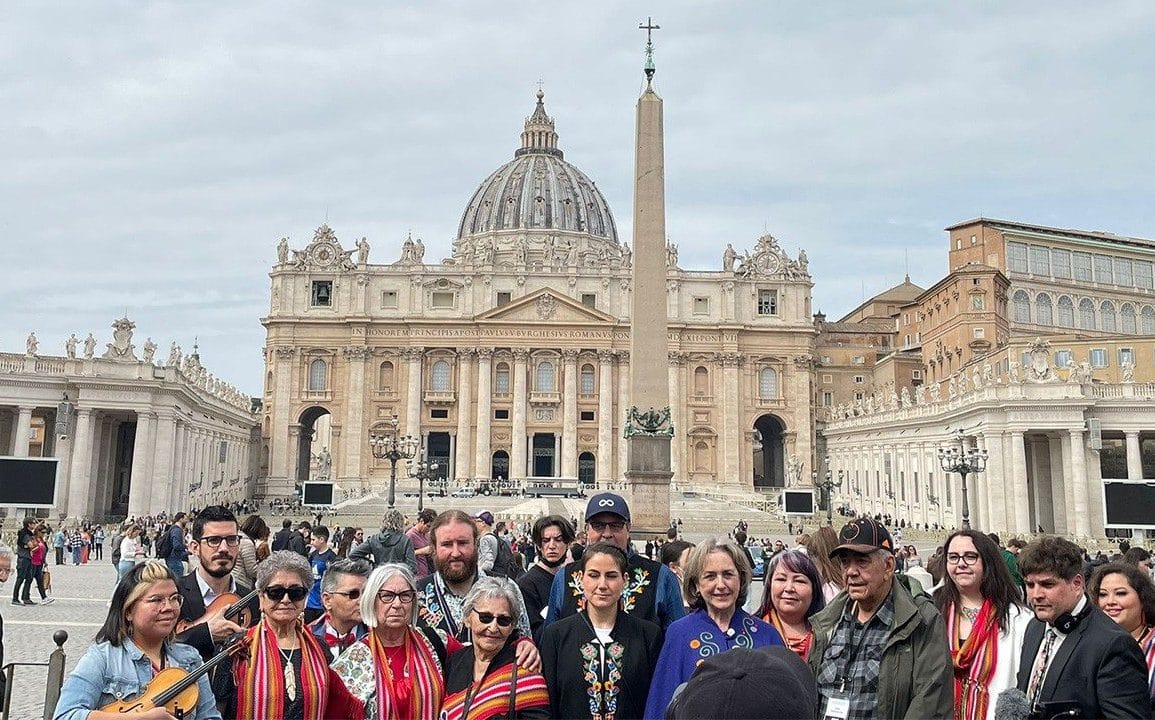Canadian indigenous seek a healing partner in the Church.
Following their meeting with Pope Francis on Monday morning, the representatives of two delegations of Canadian indigenous peoples recounted to Vatican News their experiences and hopes on the journey to reconciliation.
Representatives of the Métis Nation and Inuit Tapiriit Kanatami delegations welcomed by Pope Francis Monday morning held briefings later in the afternoon. They, along with Canadian Bishops accompanying them, spoke about these encounters and what their hopes are for the next steps.
The delegations have come to Rome to discuss the involvement of Catholic institutions in Canada’s former residential schools. Grave abuses were committed by some members of the Catholic community in these schools, leaving lasting scars on indigenous people and communities.
Both groups in the media briefings expressed their profound appreciation for the Pope’s warm welcome and his close, attentive listening to their stories, hopes, and aspirations. They also expressed their desire that the Church not only address past abuse that occurred in the Residential Schools, but partner with them in helping survivors and their families in the healing process, as well as bringing any perpetrators still alive to justice. The logo and theme of both briefings appearing in the background echoed this sentiment, “Walking together – toward healing and reconciliation.”
The first media briefing brought together the President of the Métis National Council, Cassidy Caron, with two fellow members of her delegation (Mitchell Case and Pixie Wells). They were joined by Canadian Archbishop Donald Bolen of Regina and Bishop Raymond Poisson, President of the Canadian Conference of Catholic Bishops.
The Métis National Council President noted that the meeting marked an important step in the reconciliation process her people seek and is a key moment to uphold and elevate the dignity of the survivors of abuse. She said she invited the Pope to join them on the path to truth, healing, justice, and reconciliation. All these are essential, she said, to heal past traumas and protect the children of today and tomorrow. She also acknowledged that the reconciliation process involves and requires action from all Canadians, the government, churches, and parishioners. Cassidy Caron’s fellow members expressed their satisfaction that survivors were able to tell their stories since their experience of being silenced has compounded their suffering. They noted that even the families of survivors who have already died need the past suffering to be heard so that closure can take place.
Many years of work culminated in the meeting of the delegates with Pope Francis, Archbishop Bolen noted. This meeting marks a new high mark in walking together toward healing the past. He explained how all those who spoke appreciated being able to tell their difficult stories to the Pope directly and how the Pope listened attentively, engaging on a very personal level with what he heard. Archbishop Bolen underscored the Church’s wish to stand with them in their pursuit of healing and justice, walking together on this path.
The second media briefing immediately followed the first one and brought together the President of the Inuit Tapiriit Kanatami, Natan Obed, a member of his delegation (Martha Greig), and accompanying Archbishop Richard Gagnon of Winnipeg and Bishop William McGratten, Vice-President of the Canadian Bishops Conference.
President Obed said his delegation meeting with the Pope consisted of those speaking on behalf of Inuit People living in Canada, and others who brought their own personal messages, representative of the challenges being addressed. He expressed his gratitude for the Pope’s warm welcome and engagement with them and praised the members of his delegation in bringing forthrightly their concerns and personal stories. He noted the inter-generational trauma that needs healing and the positive role the Church can play in the reconciliation process. He expressed hopes for a formal apology to all indigenous peoples for the hurt and suffering, as well as the assurance of concrete ongoing solidarity so people can build lives destroyed by past abuses. And he added that part of this requires bringing to justice any perpetrators who are still alive. He concluded by saying reconciliation must be based on action and works best with mutually shared goals.
Residential school abuse survivor, Martha Greig told her story to Pope Francis. She said authentic healing requires asking for and giving forgiveness in order to recover from the hurt. The Church and survivors can work together for this, she said and agreed that an apology would mean so much to survivors still alive and their families.
Archbishop Gagnon underscored the important step these meetings represent. He said by dialoguing and listening, we are better able to understand the truth. From that, the path to reconciliation, and hopefully the healing and forgiveness that everyone desires is better traced out.
After meeting with representatives of the Métis and Inuit peoples on Monday, Pope Francis will welcome the delegation representing the Assembly of First Nations on Thursday.










